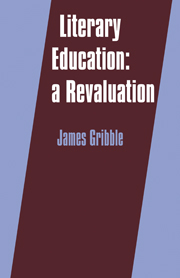Book contents
- Frontmatter
- Contents
- Acknowledgements
- Introduction Literature, life and education: some problems about how they relate to one another
- 1 Literature and truth
- 2 Literary criticism and literary education
- 3 Objectivity and subjectivity in literary education
- 4 The subordination of criticism to theory: structuralism and deconstructionism
- 5 Literature and the education of the emotions
- 6 Empathy and literary education
- 7 Literary intention and literary education
- 8 Literature, morality and censorship
- Notes
- Index
- Frontmatter
- Contents
- Acknowledgements
- Introduction Literature, life and education: some problems about how they relate to one another
- 1 Literature and truth
- 2 Literary criticism and literary education
- 3 Objectivity and subjectivity in literary education
- 4 The subordination of criticism to theory: structuralism and deconstructionism
- 5 Literature and the education of the emotions
- 6 Empathy and literary education
- 7 Literary intention and literary education
- 8 Literature, morality and censorship
- Notes
- Index
Summary
Introduction
Where men are concerned I have always lacked a simple quality known as caution, or perhaps you might call it common sense. I meet a guy any other self-respecting woman would automatically run miles from and I manage to find something endearing about all his questionable characteristics, something rivetingly attractive about his manias. Adrian loved to hear this. Of course he excluded himself from the company of the other neurotics I had known. It never occurred to him that he was part of any pattern.
‘I'm the only man you've ever met you can't categorize,’ he said triumphantly. And then he waited for me to categorize the others. And I obliged. Oh, I knew I was making my life into a song-and-dance routine, a production number, a shaggy dog story, a sick joke, a bit. I thought of all the longing, the pain, the letters (sent and unsent), the crying jags, the telephone monologues, the suffering, the rationalizing, the analyzing which had gone into each of these relationships, each of these relation-dinghies, each of these relation-liners. I knew that the way I described them was a betrayal of their complexity, their humanity, their confusion. Life has no plot. It is far more interesting than anything you can say about it because language, by its very nature, orders things and life really has no order. Even those writers who respect the beautiful anarchy of life and try to get it all into their books, wind up making it seem much more ordered than it ever was and do not, finally, tell the truth. […]
- Type
- Chapter
- Information
- Literary EducationA Revaluation, pp. 7 - 31Publisher: Cambridge University PressPrint publication year: 1983



